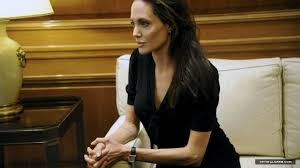Angelina Jolie Pitt, the UN refugee agency’s special envoy, has warned that the international humanitarian system for refugees is breaking down.
Ms Jolie Pitt has been speaking as part of the BBC’s World on the Move day of coverage of global migration issues.
She warned against a “fear of migration” and a “race to the bottom” as countries competed to be the toughest to protect themselves.
Earlier, the UNHCR’s head said the refugee crisis was now a global issue.
UN High Commissioner for Refugees Filippo Grandi told the BBC that simply turning migrants away “won’t work”.
BBC News World On The Move is a day of coverage dedicated to migration, and the effect it is having on our world.
A range of speakers, including the UNHCR’s special envoy Angelina Jolie Pitt, and former British secret intelligence chief Sir Richard Dearlove, will set out the most important new ideas shaping our thinking on economic development, security and humanitarian assistance.
You can follow the discussion and reaction to it, with live online coverage on the BBC News website.
Ms Jolie Pitt said that more than 60 million people – one in 122 – were displaced globally – more than at any time in the past 70 years.
“This tells us something deeply worrying about the peace and security of the world,” she said, adding: “The average time a person will be displaced is now nearly 20 years.”
Ms Jolie Pitt said the “number of conflicts and scale of displacement had grown so large” the system to protect and return refugees was not working.
She said that UN appeals were drastically under-funded.
“With this then the state of today’s world, is it any surprise that some of these desperate people, who are running out of all options and who see no hope of returning home, would make a push for Europe as a last resort, even at the risk of death?”
But Ms Jolie Pitt said that Europe was “only a fraction of the global refugee problem”.
Highlighting Turkey, Pakistan, Lebanon, Iran, Ethiopia, and Jordan, she said: “We in the West are neither at the centre of the refugee crisis, nor – for the most part – the ones making the greatest sacrifice.”
She warned that amid a “fear of uncontrolled migration” there was a “risk of a race to the bottom, with countries competing to be the toughest, in the hope of protecting themselves whatever the cost or challenge to their neighbours, and despite their international responsibilities”.
Isolationism was not the answer, she said, adding: “If your neighbour’s house is on fire you are not safe if you lock your doors. Strength lies in being unafraid.”
Such policies would lead to an even greater set of problems, she said.
“It would amount to the worst of both worlds: failing to tackle the issue and undermining international law and our values in the process.”
Urging the world to rally together, she said: “Whether we succeed will help define this century… the alternative is chaos.”
Earlier, Mr Grandi told the BBC migration was now a global phenomenon needing a global response.
He said the burden of caring for refugees had so far fallen “on a few countries that host hundreds of thousands of refugees, usually those near wars, near conflicts and a few donors that alone, seven or eight of them, give 80%-90%, of the funding”.
He admitted a solution would require “a very long and difficult discussion” but added: “There can’t simply be a reaction whereby states shut down borders and push people away simply because it won’t work.”
Save the Children is calling for greater international commitment to ensure child refugees remain in school.
The charity’s new report, A New Deal for Refugees, says only one in four refugee children is now enrolled in secondary school.
It is calling on governments and aid agencies to adopt a new policy framework that will ensure no refugee child remains out of school for more than a month.
It is an ambitious target but there is growing concern that this migration crisis is producing a lost generation of children which means conditions for even greater insecurity and poverty.
BBC
 Q FM Africa's Modern Radio
Q FM Africa's Modern Radio

